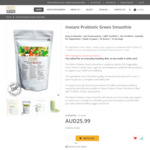10% off and Free Delivery
Instant probiotic green smoothie with 82 Vegetables, Fruits, Herbs, Cereals, Nuts, Legumes and Seaweeds.
Filled with 10 billion of lactic acid bacteria. 100% Vegetarian. Made in Japan.
You don’t need a blender. All you need is a shaker bottle or you can even stir well in a glass.
* For children who do not eat vegetables
* For people on the go
* For people of all ages who are into fitness
* For aged people who find it difficult to chew their food
* Being a probiotic drink it is basically a drink for all
Probiotic Green Smoothie 10% off $23.39 (was $25.99) + Free Shipping (Made in Japan) @ Nizen Australia
Last edited 24/05/2018 - 16:22 by 1 other user
Related Stores
closed Comments

10 billion bacteria for $25.99. Works out to be less than $0.0001 per bacteria.

" fermented and matured" - doesn't this remove nearly all the nutrients of the vegetables and fruits lol?

Lactic acid bacteria but 100% vegetarian. Righty-o.

Nothing wrong with that statement, they didn't say vegan.

Sorry to break it to you, but bacteria aren't vegetables, not even 1%. 10 billion of them would dilute the vegetarian content from 100%.

They're not animals either

@sTon3r: Vegan can have micro-organisms too. It is hard to live without killing because air too has micro-organisms .
You need to read about Jains…
the Jains extend the concept of ahimsa not only to humans but to all animals, plants, micro-organisms and all beings having life or life potential. All life is sacred and everything has a right to live fearlessly to its maximum potential. Living beings need not fear those who have taken the vow of ahimsa. According to Jainism, protection of life, also known as abhayadānam, is the supreme charity that a person can make.[2] https://en.wikipedia.org/wiki/Ahimsa_in_Jainism

@Frugal Rock: Not from lactose. Also not normally from the direct exploitation of any sentient being. Lactic acid is usually vegan.

@codebased: Jainism and veganism are totally unrelated except that Jains should, according to their own beliefs, live vegan as a minimum. Veganism is not concerned with non-sentient beings (as informed by the consensus of modern science - plants, bacteria, "life potential" whatever that is) nor any concept of sacredness, charity, karma or other such things.

@thevofa:
Do you really think the lactic acid bacteria were found randomly, naturally in the wild, or from cow/calf stomachs?
@Frugal Rock: They are found in many organic sources including rotting vegetation. They also replicate without the need for any living hosts; industrial manufacture, driven by economics as it is, will almost definitely not rely on harvesting from living hosts, much less from sentient hosts.
That said, the product is not vegan anyway as it contains
stolenbeevomithoney and quite likely the vit D is from killed sheep.
@thevofa:
"Lactobacillus casei and rhamnosus are abundant in raw milk and are commonly used as probiotics, or healthy bacteria.""Another dominant species of lactic acid bacteria found in raw cow milk is streptococcus. … Streptococcus thermophilus is a probiotic that helps improve digestion, enhances immunity,"
Your fantasy world sounds pretty fun, though.

@thevofa:
"Not from lactose." and "Lactic acid is usually vegan." is comedy."Lactic acid is produced industrially by bacterial fermentation of carbohydrates (sugar, starch) or by chemical synthesis from acetaldehyde, that is available from coal or crude oil. In 2009 lactic acid was produced predominantly (70–90%) by fermentation."
Fermentation by Lactobacillus strains from cows.

Fermentation by Lactobacillus strains from cows, using dairy.
Fermentation by lactobacillus != Fermentation by Lactobacillus strains from cows, using dairy.
This is a prime example of faulty generalization / Chinese whispers. Also, negs are not logical arguments. Also, vegetarians consume much more than vegetables: water, salt, mushrooms, fruits, pulses, grains, etc.
Let everyone do their own research if they are so bothered.
Have a good day.

@thevofa:
Your martian tangent was hardly a logical argument, so too your immaculate conception of lactobacillus theory.
Lactobacillus isn't isolated to live in milk
Lactic Acid Bacteria (aka lactobacillus + others) - they're named this because of their tolerance to lactic acid (and other organic acids)
It's odd you guys are arguing about their vegetarian / vegan status
They don't eat protein….

5% OFF. Just use coupon code FBEXCL05

Bit late now, shoulda posted the discount to begin with, with code in the coupon field. 5% is nothing special anyhow…

Why is the bacteria strain not listed on the ingredients?

Ingredients
Dextrin, young barley leaf powder, digestion-resistant dextrin, psyllium husk, chia seeds, oligosaccharide, vegetable mixed powder (young barley leaf, kale, broccoli, pumpkin, bok choy, parsley, carrot, celery, bitter melon, spinach, mulberry leaves, moroheiya, mugwort, (tomato), konjak tuber extract, fermented plant extract (dextrin, brown sugar, fruit, vegetable (orange, pineapple, banana, apple, papaya, guava, carrot, kiwi fruit, others), wild plant extract (pfaffia, rosemary, catuaba, purple ipe, cat's-claw, others), cereals (brown rice, kidney bean, corn, oats, barley, peas, cashew nut, black sesame, millet, soybean, rye, others), seaweeds (wakame, kelp, laver), honey, soybean curd refuse powder, starch, lactic acid bacteria (sterilization) baker's yeast (zinc, manganese, copper, iodine, Selenium, chrome, molybdenum), citric acid, flavor, polysaccharide thickener, crystalline cellulose, sweetener (aspartame, L-phenylalanine compound), Vitamin C, Vitamin E, Niacin, Pantothenic acid Ca, Vitamin B1, Vitamin B2, Vitamin B6, Vitamin A, Folic acid, Vitamin D, Vitamin B12.

That is not the strain of the bacteria.

Lactobacillus - that is already mentioned in the product

What does the 'sterilization' mean?
Also, how are the minerals in the bakers yeast? Haven't seen that before
@Helenn:
Regarding Sterilization:
Lactic acid bacteria (sterilization) refers that the lactic acid bacteria is sterilized. Sterilization is normally done so that the packaged product can be stored for a long period at ambient temperature, without spoilage by microorganisms.Regarding minerals in Baker’s yeast:
Baker’s yeast contains these minerals. Please refer the link https://en.wikipedia.org/wiki/Baker%27s_yeast for reference.Yeast, baker's, active dry
Nutritional value per 100 g (3.5 oz)Energy
1,361 kJ (325 kcal)Carbohydrates
41.22 gSugars
0 gDietary fiber
26.9 gFat
7.61 gProtein
40.44 gVitamins
Quantity
%DV†Thiamine (B1)
956%
10.99 mgRiboflavin (B2)
333%
4 mgNiacin (B3)
268%
40.2 mgPantothenic acid (B5)
270%
13.5 mgVitamin B6
115%
1.5 mgFolate (B9)
585%
2340 μgCholine
7%
32 mgVitamin C
0%
0.3 mgMinerals
Quantity
%DV†Calcium
3%
30 mgIron
17%
2.17 mgMagnesium
15%
54 mgManganese
15%
0.312 mg
Phosphorus91%
637 mgPotassium
20%
955 mgSodium
3%
51 mgZinc
84%
7.94 mgOther constituents Quantity
Water 5.08 g

I’ve stopped all probiotics and just eat yoghurt now, as recommended by my own research. It’s regulated and I know what I’m eating

Care to share why?

I've stopped eating all oligosaccharide's now, as recommended by my N=1 research.


what is the deal here??? how can you define this as a bargain? It's the regular everyday price.